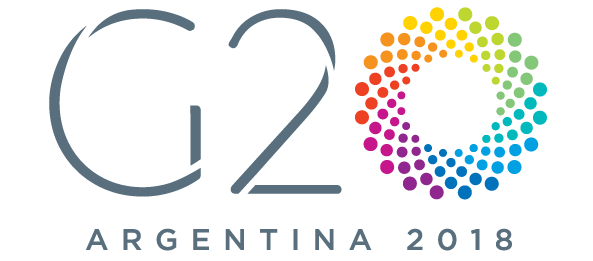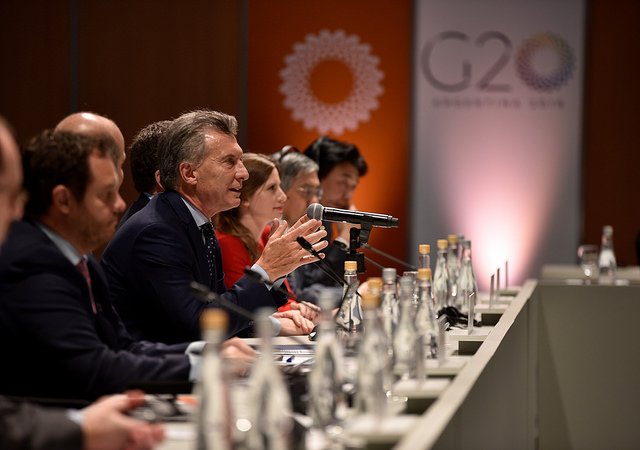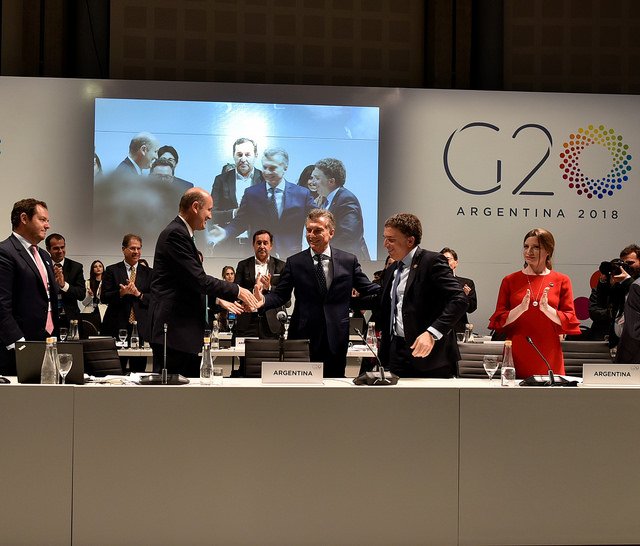
The 2018 G20 Buenos Aires summit will be the thirteenth meeting of Group of Twenty (G20). It will be held in 2018 in the city of Buenos Aires (Argentina). It will be the first-ever G20 summit to be hosted in South America.
President Mauricio Macri of Argentina assumed the one-year G20 presidency on 30 November 2017, during an official ceremony in Kirchner Cultural Centre in Buenos Aires, Argentina. President Xi Jinping of China (2016 host), Chancellor Angela Merkel of Germany (2017 host), and Prime Minister Shinzo Abe of Japan (2019 host) all gave messages of support which were shown at the ceremony.
The first G20 meetings of the Argentine Presidency began in Bariloche in early December 2017. They were attended by central bank deputy governors and deputy ministers of finance, as well as the sherpas (official representatives to the group). During the buildup to the G20 Summit between world leaders on 30 November 2018, Argentina will host over 45 meetings at various government levels and areas in 11 different cities throughout the country.
AGENDA

The G20's yearly agenda includes over 50 meetings of ministers, foreign ministry emissaries (known as sherpas), central bank governors, and world leaders. Each year’s agenda cycle culminates in the Leaders Summit attended by heads of state or government, where they issue a joint declaration on the policy formed by the G20 meetings throughout the year. For example:
At the Hamburg 2017 G20 Summit, world leaders agreed to limit protectionism, commit to a rules-based international trade system, and advance policies which share the benefits of globalisation.
At the Hangzhou 2016 G20 Summit, leaders agreed to expand the role of the G20 to establish more global cooperation on tax evasion, and to promote international collaboration to facilitate cross-border investment in green bonds.
The work of the G20 is generally divided into two tracks:
The Finance track comprises all meetings with G20 finance ministers and central bank governors and their deputies. Convening several times throughout the year, they focus on financial and economic issues, such as monetary, fiscal and exchange rate policies, infrastructure investment, financial regulation, financial inclusion and international taxation.
The Sherpa track focuses on broader issues such as political engagement, anti-corruption, development, trade, energy and climate change, gender equality, among others. Each G20 country is represented at these meetings by its relevant minister, and by its designated sherpa, or emissary. The sherpa engages in planning, negotiation and implementation tasks on behalf of the leader of their respective country. Each sherpa orients their minister and head of state or government accordingly on the progress of the G20, and delegates the dialogue and topics to relevant working groups.
Each year, when a new country takes on the presidency (in this case Argentina), it works hand-in-hand with the previous presidency (in this case Germany), and the following presidency (Japan) in what is collectively known as the Troika. This is to ensure consistency and continuity of the group's agenda.
The presidency of the G20 rotates annually between the group’s 19 member countries. As the G20 has no headquarters or permanent staff, the country which holds the G20 presidency hosts the meetings and plays a leading role in setting the agenda and building consensus among members.
To broaden the scope and impact of the G20 and ensure its focus is truly global, leading international organizations, such the United Nations (UN), International Monetary Fund (IMF) and the World Bank, are invited to take part.
The G20 seeks to enrich its agenda and decision-making by drawing on perspectives and expertise beyond its member governments. It therefore confers with a set of engagement groups: civil society organizations from the G20 nations that represent different sectors of society. Each engagement group is independent and chaired by one of its national members. It develops a set of policy recommendations that are formally submitted to the G20 ahead of the summit.
The current engagement groups of the G20 are the following: Business (B20), Civil Society (C20), Labour (L20), Science (S20), Think Tanks (T20), Women (W20) and Youth (Y20).
AIM

Technological change is extraordinary in its magnitude and speed. The emergence of new technologies has led to the development of new forms of work that are rapidly changing production processes worldwide. This offers huge opportunities to accomplish fair and sustainable development; yet it also presents challenges that are putting pressure on the employment, welfare and education agendas.
Policy responses need to ensure that embracing technological change will not engender exclusion, social disintegration, or backlash. Providing these responses in a coordinated manner will also help prevent excessive gaps in technology adoption across countries and surging inequality among them.
We need to create the conditions for more and better jobs. We need to provide tools and skills to those people looking for a job and those whose jobs are at risk of being replaced by automation. We should explore global initiatives that ensure that everyone has a chance to develop their full potential so as to benefit from the new technological era.
We will seek to pin down the impact that technological change is having on productivity, growth, jobs, and inequality. Following a diagnostics phase, we will also explore the policies needed to embrace the opportunities and address the challenges presented by technology.
Education is at the crux of this debate. Education empowers people to shape their own futures. It enables them to create their own endeavours and form an active citizenship able to contribute to the development of a world that is both fairer and more sustainable.
Making the new wave of technological breakthroughs as inclusive as possible will require considerable investment in training and skills for life and work. It may also require an adaptation in our fiscal policies or structural reforms. Now is the moment to shape the opportunities and skills that prepare our citizens for change.
Source: https://en.wikipedia.org/wiki/2018_G20_Buenos_Aires_summit
Not indicating that the content you copy/paste is not your original work could be seen as plagiarism.
Some tips to share content and add value:
Repeated plagiarized posts are considered spam. Spam is discouraged by the community, and may result in action from the cheetah bot.
Creative Commons: If you are posting content under a Creative Commons license, please attribute and link according to the specific license. If you are posting content under CC0 or Public Domain please consider noting that at the end of your post.
If you are actually the original author, please do reply to let us know!
Thank You!
Hope this brings good impact into cryto trading.
@originalworks